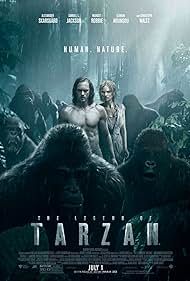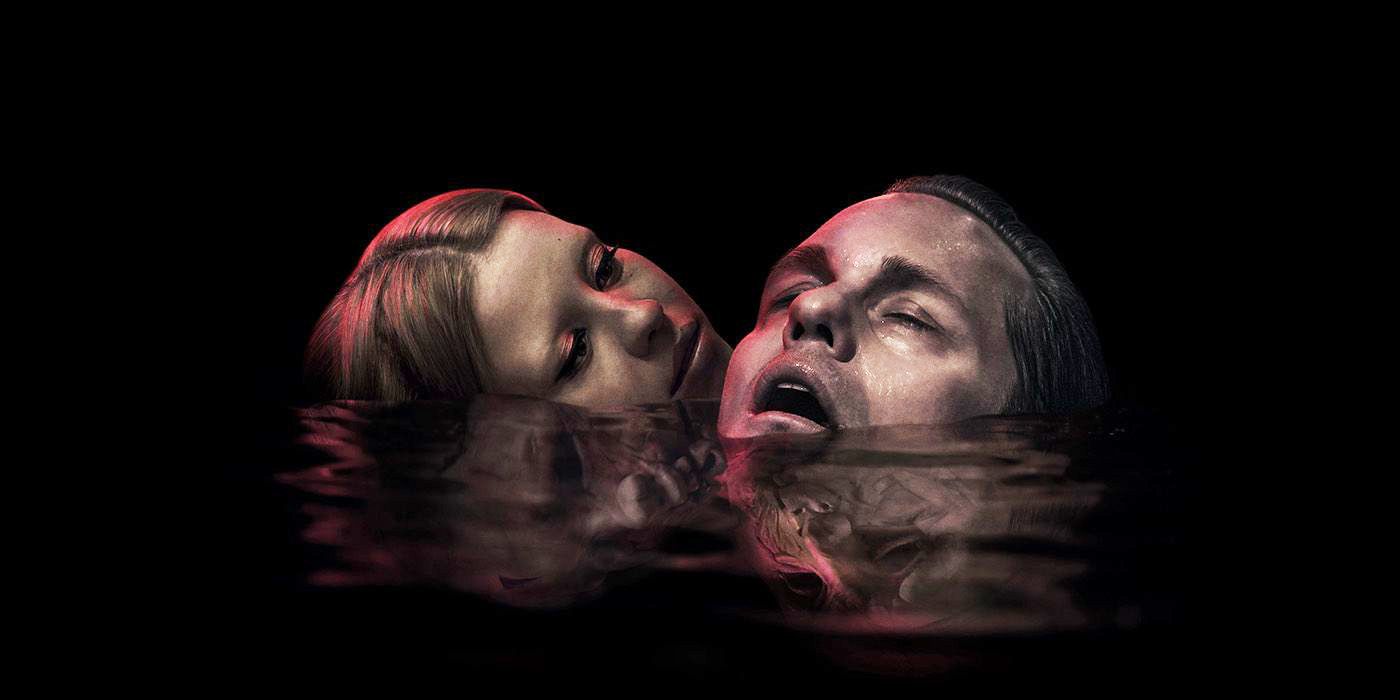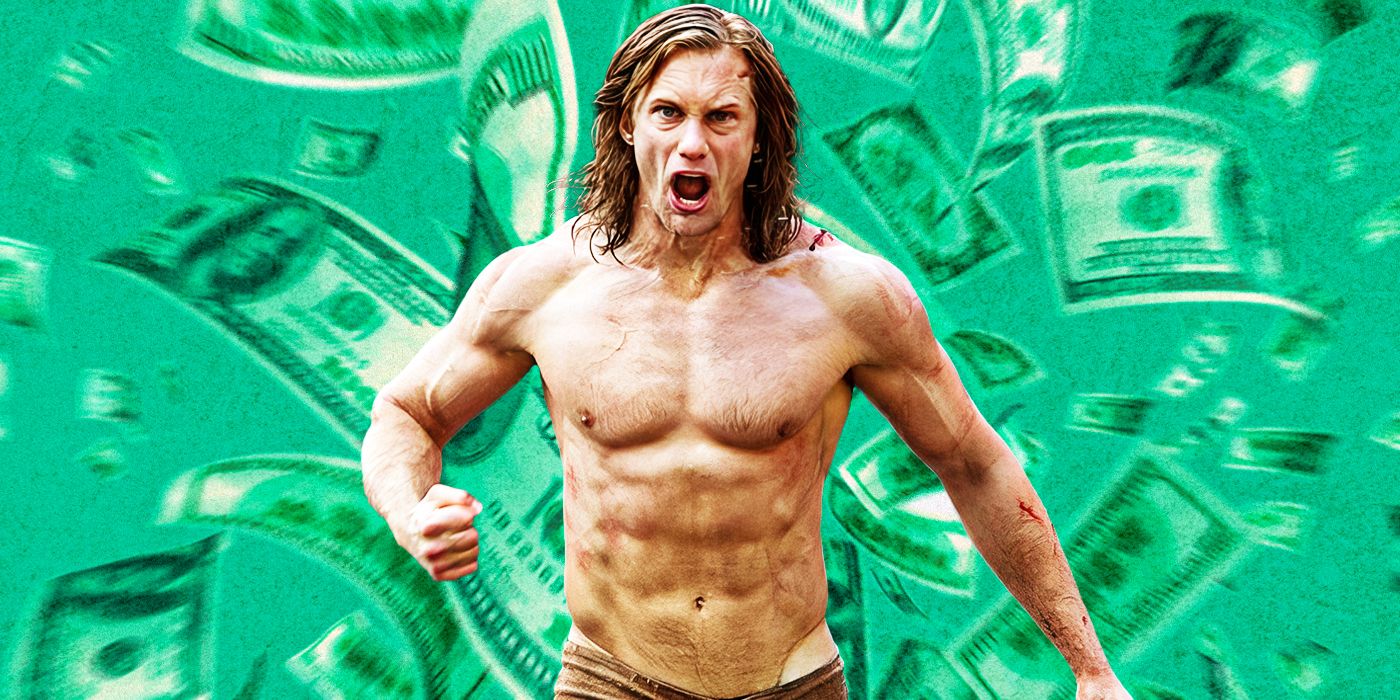The Big Picture
- Skarsgård's role in The Legend of Tarzan helped him establish himself as a leading man.
- The film's success was unexpected, outperforming other big-budget movies of the year.
- Skarsgård's performance as Tarzan was both charismatic and physically impressive, making the character relevant and cool again.
Alexander Skarsgård has more or less dominated television screens for the past decade. Between his Emmy winning villainous turn in Big Little Lies, his quietly charismatic espionage agent in Little Drummer Girl, and his scene-stealing tech giant on Succession, Skarsgård is a true chameleon that embodies the “character actor in a leading man’s body” description perfectly. On the film side, Skarsgård’s best work has tended to be in smaller, cutting edge genre projects that aren’t intended to be blockbusters. As beautifully deranged as Infinity Pool, The Northman, Hold the Dark, Mute, The Hummingbird Project, and Melancholia are, they weren’t intended to launch Skarsgård as a leading man on the level of say Robert Downey Jr. or Tom Cruise. However, Skarsgård did star in one of the strangest box office sensations in recent memory when he appeared in 2016’s The Legend of Tarzan, a film that landed with a significant impact before seemingly disappearing from the public consciousness entirely.

The Legend of Tarzan
Tarzan, having acclimated to life in London, is called back to his former home in the jungle to investigate the activities at a mining encampment.
- Release Date
- July 1, 2016
- Director
- David Yates
- Cast
- Margot Robbie , Christoph Waltz , Samuel L. Jackson , Alexander Skarsgard , Casper Crump , John Hurt
- Runtime
- 110 minutes
- Main Genre
- Adventure
- Writers
- Adam Cozad , Craig Brewer , Edgar Rice Burroughs
- Studio
- Warner Bros. Pictures
- Tagline
- Human. Nature.
Alexander Skarsgård's 'The Legend of Tarzan' Was a Box Office Hit
The Legend of Tarzan was only the latest in a line of intended blockbusters based on popular intellectual property from the public domain. Taron Egerton had stepped into the role of Robin Hood, Paul W.S. Anderson tried to reboot The Three Musketeers, Guy Ritchie tried to launch a cinematic universe with King Arthur: Legend of the Sword, and Dracula: Untold failed the beloved vampire before the “Dark Universe” had a chance to.
These films have nearly always been either critical or financial disasters, and Warner Brothers released The Legend of Tarzan within their packed summer lineup, which also included Central Intelligence, The Conjuring 2, Lights Out, and Suicide Squad. Compared to an action-comedy with megastars like Dwayne Johnson and Kevin Hart, a sequel to a horror hit, a low-investment PG-13 horror movie, and a comic book film with significant buzz behind it, The Legend of Tarzan seemed like it would be the only misfire in an otherwise successful summer for the studio.
However, The Legend of Tarzan somehow managed to gross over $350 million worldwide, becoming one of the biggest success stories of the year. It wasn’t even starved for competition. The summer of 2016 was when many storied franchises became major disappointments, with Jason Bourne, Star Trek Beyond, X-Men: Apocalypse, Alice Through the Looking Glass, Teenage Mutant Ninja Turtles: Out of the Shadows, Neighbors 2: Sorority Rising, Independence Day: Resurgence, and even Mechanic: Resurrection falling short of their predecessors. How a film based on a legend that has existed for centuries ended up performing better than superheroes, Disney icons, highly-anticipated sequels, and even the crew of the USS Enterprise remains an enigma. Perhaps the film was just a breath of fresh air, or perhaps Skarsgård is a bigger star than studios are willing to give him credit for.
Alexander Skarsgård Launched the Definitive Tarzan
The Legend of Tarzan comes from director David Yates in his first non-Wizarding World project since his 1998 feature film debut The Tichborne Claimant. Attempting to take a more serious approach to Tarzan mythology, the film replaces any straightforward fantasy elements with simplistic (yet plausible enough) scientific explanations. It also wasn’t an origin story; Skarsgård’s Tarzan has already returned to London and is living happily as John Clayton with his wife Jane (Margot Robbie). However, Tarzan is convinced to go back into the jungles where he grew up when the American entrepreneur George Washington Williams (Samuel L. Jackson) approaches him with a potential mission to prevent the fascist Belgian military officer Captain Leon Rom (Christoph Waltz) from pillaging the region of diamonds, and presumably demolishing the native African tribes and animal population.

'Infinity Pool' Ending Explained: Alexander Skarsgård Gets All Wet
Once Pandora's box has been opened, there is no closing it.Skarsgård gets the chance to do some real acting, giving a dynamic performance as a conflicted hero. Returning to his childhood comes with responsibilities and memories that he’s left behind, as Tarzan is content with his current life with the woman he loves. It’s a fascinating approach that gets rid of the obvious exposition beats that these sorts of reboots typically suffer from. The film gets to judiciously work in flashbacks to pivotal moments within Tarzan’s youth that explain his connection to these versions of the supporting characters, but for the most part it’s about a former icon becoming the “true hero” that they’re known for in legend. This conceit rests on a charismatic leading man, and Skarsgård fit that profile perfectly.
Alexander Skarsgård Was Perfect for 'The Legend of Tarzan'
By taking a slightly different approach, Yates also allows the audience to get what they paid for immediately when Skarsgård is sent into the jungle to start taking down bad guys and swinging between vines. The supporting characters are thin, but not shallow, and everyone has enough charisma in roles that were built for them that it works. If you want a feisty, modern take on a classic heroine, why not get Robbie? If you need a scene-stealing comedic supporting character, is there anyone better than Sam Jackson? Who else would you cast as a ruthless, yet slightly eccentric villain with a ridiculous accent than Waltz? These aren’t roles any of them hadn’t played before, but they fit the bill as long as Skarsgård did his part.
There’s an inherent magnetism to Skarsgård that clearly had an impact on audiences; by quietly winking at the more ridiculous elements of the story, adding brief moments of hesitation before action scenes, and showing genuine anger towards the slaving practices, Skarsgård was taking the character in a modern, yet slightly self-aware direction. The film is about a “legend,” but Skarsgård was attempting to look at the man beneath all those who didn’t necessarily ask for his story to become a childhood fable. At the same time, Skarsgård’s physicality was something truly extraordinary, and while the film certainly uses a fair amount of CGI, there’s not a hint of plasticity to seeing Tarzan in action.
Those who have dismissed Skarsgård as just another forgettable leading man may have forgotten that the True Blood star is an Emmy winner, a favorite of Lars von Trier and Robert Eggers, a standout character on Succession (a show packed with scene-stealers), and successfully launched Godzilla vs. Kong as the first major mid-pandemic box office smash. If that’s not enough to convince them that he’s a major star, then the fact that he made Tarzan “cool” again should be all the evidence that is needed.
The Legend of Tarzan is available to watch on Netflix in the U.S.

